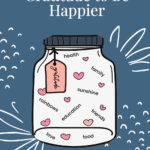
– How to Practice Gratitude How to Be Happier –
Carrying on with my series on positive emotions, today I will be exploring the positive emotion of gratitude and how to use gratitude to be happier in our lives.
So What exactly is Gratitude?
Gratitude is feeling esteem for something or someone. It is the feeling we get when we live in the present with an open heart and mind, savouring appreciation for the good in our lives.
“Angeles Arrien, author of Living in Gratitude: A Journey That Will Change Your Life, describes grateful seeing as
the ability to look first at what is good and working in our lives without minimising or denying the hardships that are also present.
Why it’s So Crucial to Have an Attitude of Gratitude How to Be Happier
You may have noticed that what we focus on tends to grow. When we are feeling gratitude, we are focusing on good things, and that is only one of the many reasons why, along with hope and zest, gratitude is considered one of the top three positive emotions. Some psychologists argue that it is the number one most fundamental positive emotion for improving happiness.
“All in all, science confirms that the life-giving practice of gratitude broadens our lives by enabling healing of the past, providing contentment in the present, and delivering hope for the future.” ~ Robert Emma “Gratitude Works”
The practise of gratitude has been proven to result in increased feelings of energy, alertness, enthusiasm and success in achieving personal goals. It has beneficial in stress management, improves feelings of self-worth and self-confidence. It also improves cardiac health through increases in vagal tone and provides us with a greater sense of purpose and resilience.
The act of feeling grateful, savouring feelings of appreciation, makes us feel more content and can help us conquer depression and anxiety.
In his book “Gratitude Works” Robert Mons, who spent his life devoted to the science boosting well-being, says:
“Gratitude is important not only because it helps us to do good. Gratitude heals, energises and transforms lives in myriad ways.” – Robert Emmons
His years of groundbreaking research on the topic discovered that although it can be a challenging habit to implement, there are ways to do it, and if we stay determined and don’t give up, we can live with gratitude.
So how can that we can cultivate more of this positive emotion to improve our life satisfaction?
Six Science-Backed Ways to Practice Gratitude How to Be Happier
1. Make a Weekly Gratitude List
Researchers have demonstrated that the relatively simple act of writing on a piece of paper, five things that a person can find to feel grateful for only once a week, resulted in a 25% increase in happiness. 25 percent!!! That’s a big happiness boost!
If you are considering adopting this practice, it is worth noting that it is crucial to savour the feeling of gratitude as you make your list. For example, if you write that you are grateful for a beautiful sunny day, take a moment to look at the blue sky and savour your feeling of appreciation.
2. How to be Happier Journal
Writing about what you feel grateful for can transform your mindset from its default mode of looking for danger and negativity to see more clearly what is going right.
Take five to ten minutes, at least once a week, to write about the things you feel grateful for. This could be simple things such as a cuddle from a beloved pet, an unexpected call from a friend or a funny show on Netflix.
It doesn’t matter how big or small the things you write about are. What matters is that you feel the gratitude as you write. Make sure to give details about what you feel grateful for, and savour the feelings of gratitude as you go, rather than just making a list.
You could also write a letter of gratitude to someone or even to the universe to envoke feelings of appreciation.
3. Practice Humility
Emmons’s work found that the biggest obstacle to gratitude was having a sense of entitlement. When we feel entitled to all the good things in our lives, we can’t feel grateful for them because we can’t see how lucky we are to have them. We just think they are there for us because we are fantastic, so they can’t be that special. The antidote to feeling entitled is practicing humility.
4. Don’t Take The Good Stuff for Granted
Along with entitlement, another obstacle to feelings of gratitude is taking the good things in your life for granted. Taking the good people and the good stuff “as granted” in our lives prevents us from appreciating them and therefore experiencing gratitude. Taking things for granted can also be a way of losing them. This can negatively impact our happiness levels.
5. Think of your Death
Studies have shown that thinking about one’s own mortality makes a person more grateful for the life that he or she has. Facing the possibility of dying motivates people to appreciate their life.
Many religions also believe that we should consider our death every day to be mindful of how we choose to live and think about our lives.
The stoic philosophers were also fans of this concept of remembering our deaths and being grateful for the limited time we have. Marcus Aurelius, the Roman emperor-philosopher, said, “You could leave life right now. Let that determine what you do and say and think.”
6. Reflect on Your Challenges through a Positive Lens for Increased Happiness
As well as reflecting on our death, it is also good to reflect on past challenging times in your life and consider how those challenges have made you stronger or somehow benefited your life. What were the silver linings to all those clouds?
Try this exercise. At the end of each day, ponder back on what went well and why.
It is far too easy to fall into the snare of ruminating about problems or setbacks that we can’t do anything about. Instead, we can alter our focus to what is going well, we increase gratitude and contentment are so crucial to our happiness.
“I believe that gratitude is the best approach to life. When life is going well, it allows us to celebrate and magnify the goodness. When life is going badly, it provides a perspective by which we can view life in its entirety and not be overwhelmed by temporary experiences. And this is what grateful people do. They have learned to transform adversity into an opportunity no matter what happens, to see existence itself as a gift.”
~ Robert Emmons
How to be Happier In Conclusion
We can be happier by cultivating an attitude of gratitude. It is an ongoing practice that you have to be mindful of every day. If we persevere toward that end, we will be in a much stronger position to navigate even the most challenging times of our lives. This is because we will be living with all the benefits that gratitude brings us.
If you are going through a dark patch, please recognise that you’ve got what it takes to survive and get stronger from it and perhaps, eventually, you may look back on your current challenges and be grateful for the strength and wisdom they have brought you so why wait?
P.S. If you’re looking for more happiness strategies, click checkout my blog post here.

+ show Comments
- Hide Comments
add a comment